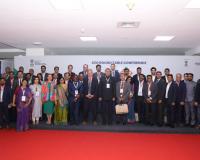Gujarat Steps Up Fight Against Sickle Cell Anemia
Special focus on tribal communities as state intensifies screening and awareness efforts

Gandhinagar - Sickle cell anemia, a genetic blood disorder predominantly affecting the tribal community, is at the forefront of Gujarat's public health initiatives. World Sickle Cell Day, observed on June 19, aims to raise global awareness about this debilitating disease. In Gujarat, it is particularly prevalent among tribes from Ambaji to Umargam, spanning 14 districts including Aravalli, Banaskantha, Sabarkantha, Bharuch, Chhota Udaipur, Dahod, Mahisagar, Panchmahal, Narmada, Surat, Tapi, Navsari, Dang, and Valsad.
In 2006, then Chief Minister Narendra Modi launched the 'Sickle Cell Anemia Control' program to curb the incidence of the disease in Gujarat, making it the first state in India to initiate such a program. Over 1 crore people have been screened so far, with 17,69,863 individuals screened in the last five years alone. The program received national recognition from the central government in 2009-10.
Under the leadership of Chief Minister Bhupendra Patel, the state government has intensified efforts to eliminate the disease, particularly among tribal populations. Measures include expanded awareness campaigns, enhanced diagnosis and treatment facilities, and increased availability of medicines. Mass screening programs, genetic counseling, and pre-marital testing are key components of the state's strategy.
Public awareness campaigns and community outreach programs are also prioritized. Sickle cell counselors diagnose the disease in tribal districts to prevent its spread to future generations. Initial screening involves a DTT test (turbidity test), followed by the more accurate High Performance Liquid Chromatography (HPLC) test. The state has established dedicated day care centers for sickle cell patients in Valsad and Dang districts.
The state government provides disability certificates to sickle cell patients, enabling access to social security benefits. From 2024-25, financial assistance for families earning up to Rs 6 lakh annually will increase from Rs 500 to Rs 2500 per month.
Prime Minister Modi launched the National Sickle Cell Anemia Elimination Mission 2047 on July 1, 2023, aiming to eliminate the disease by 2047. This mission targets screening approximately 7 crore people aged 0-40 in 17 high-risk states, including Gujarat, with comprehensive treatment plans.
Understanding Sickle Cell Anemia
Sickle cell anemia is a genetic disorder affecting the shape of red blood cells, which become rigid and sickle-shaped, obstructing blood flow and oxygen delivery throughout the body. Symptoms include body weakness, persistent fever, jaundice, joint and bone swelling, abdominal pain, pregnancy complications, and increased susceptibility to infections, especially lung diseases.
Precautionary Measures
Patients should regularly visit hospitals and follow medical advice, drink 10-15 glasses of water daily, rest adequately, avoid stress, refrain from alcohol, drugs, and smoking, and avoid high altitudes, extreme cold, strenuous labor, and bright sunlight.
Public awareness is crucial for preventing sickle cell disease, which is hereditary. Pre-marital testing for sickle cell can prevent transmission to offspring. The government’s strategy of screening and raising awareness is vital in eradicating this disease.



